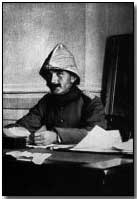Who's Who - Enver Pasha
 Enver Pasha (1881-1922) served
in the dual capacity of War Minister and Ottoman Commander-in-Chief during
World War One, and was instrumental in bringing Turkey into the war on the
side of the Central Powers.
Enver Pasha (1881-1922) served
in the dual capacity of War Minister and Ottoman Commander-in-Chief during
World War One, and was instrumental in bringing Turkey into the war on the
side of the Central Powers.
Born on 22 November 1881 in Constantinople (present day Istanbul) Enver was commissioned into the Turkish army at a young age. Undergoing part of his training in Germany he absorbed (and was impressed with) much of its culture, particularly with regard to military training. He consequently determined upon various means of improving the efficiency of the Ottoman armed forces along German lines.
In 1908 Enver was one of three leaders of the so-called 'Young Turk' movement that rebelled against Sultan Abdul Hamid, joining General Mahmud Sevket's 'Army of Deliverance' in marching upon Constantinople.
From 1909-11 he served as military attaché to Berlin. In the latter year, with Turkey at war with Italy, Enver organised Ottoman resistance in Libya. The following year (1912) he was appointed Governor of Banghazi.
1913 saw Enver lead the coup d'etat of 23 January organised by the Committee of Union and Progress, bringing full power to the Young Turks. With the success of this movement Enver remained an influential member of the Ottoman government until 1918, along with Talaat and Djemal.
During the Second Balkan War of 1913 Enver served as Chief of General Staff and, on 22 July, seized Adrianople from Bulgaria, earning himself national renown.
In 1914 Enver, Minister of War since replacing Izzet Pasha in February (and having conducted a purge of senior officers unsympathetic to the Young Turks), conducted secret negotiations with both Germany and Russia aimed at constructing military alliances with each.
Of these only the former came to fruition, leading to Turkey's entrance into the war on the side of the Central Powers in November that year. Among Enver's war aims was a plan directed at uniting the Turkic peoples of Russian Central Asia with the Ottoman Turks.
Unfortunately these same plans led to a calamitous defeat on 29 December 1914 at Sarikamis, where much of the Third Army directly under his command was lost through casualties or capture. The Russians, under Yudenich, continued to inflict severe reverses upon Ottoman forces throughout the following year.
With his credibility battered at home Enver nevertheless recovered ground with the defeat of the Allied expedition to the Dardanelles in 1915-16. Russia's withdrawal from the war, and the February Revolution of 1917, presented Enver with the opportunity to lead the Ottoman forces that occupied Baku in 1918.
The arrival of the armistice and the end of the war - and with it the fall of the Young Turk administration in October 1918 - caused Enver to flee in exile to Germany. While there he met Bolshevik leader Karl Radek and subsequently travelled to Moscow. Regarded with suspicion by the Bolsheviks his plan to overthrow Mustafa Kemal's Turkish regime found little support.
Disappointed, Enver left for Turkestan with the aim of assisting the organisation of the Central Asian republics. Instead however he joined the 1921 revolt by the Basmachi against the Bolsheviks, in the course of which he was killed during fighting with the White Russians against the Red Army on 4 August 1922; he was 40.
'minnie' was a term used to describe the German trench mortar minnenwerfer (another such term was Moaning Minnie).
- Did you know?
